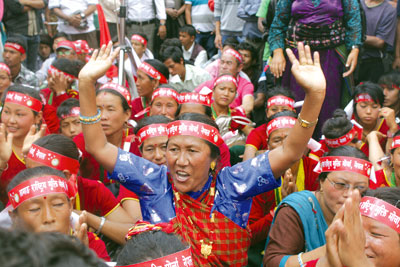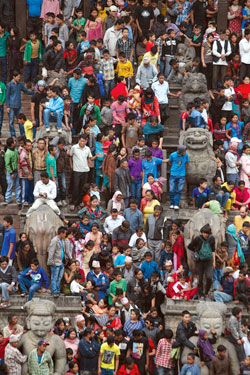 ANURAG ACHARYA |
I said I am a Tamang who had been raised as a Buddhist (though I studied in a Catholic school which is a whole different story in itself). But he told me very matter-of-factly that my surname clearly indicated my 'Hinduness' and advised me to tell everyone I am a Hindu, because then people would think highly of me. I failed sociology class and have identified as 'just Nepali' from that day onward.
Twenty five years have passed since that awkward question was asked and I am once again forced to think about my identity. I am told my caste, ethnicity and religion define who I am as an individual. My personal beliefs, aspirations, accomplishments, and the battles I have won are insignificant in front of the holy identity trinity.
I am a woman, born to a Tamang mother and a Hindu father and married into a Newar family. I believe everyone should have enough to eat and safe shelter. I believe all children should have access to free and quality education. I believe men, women and third genders are equal. I believe homosexuality, bisexuality and heterosexuality are natural human desires and the state and community have no right to judge or interfere. I believe abortion is a woman's right and prostitution should be legalised. And most importantly, I believe we should all be allowed to live on our own terms, as long as we don't harm others intentionally.
 BIKRAM RAI |
When discussions about federalism first surfaced six years ago, I wholeheartedly supported the idea of new federal states, because it no longer made sense for Kathmandu to withhold all power. I assumed handing power to local officials who have a better understanding of their areas, bringing leaders closer to the people and letting the public have greater control of state affairs would mean we would not have to live through another civil war. But the uproar of the past three weeks on the streets of the capital, the far-west and the districts of Tarai suggest we might be headed down slippery slopes again.
Powerful male (mostly Brahmin) politicians and leaders who no longer wield the same power and influence they once enjoyed, have played the dirtiest hand they could by inciting Nepalis into communalism. And now that Pandora's Box has been forced open by Pushpa Kamal Dahal, Upendra Yadav and Ang Kaji Sherpa et al, I want to ask them a few questions.
Where does a Muslim girl from Mahottari married to a Gurung from Pokhara belong? Where does the fifth generation of a Chettri family in Biratnagar belong? Where does a doctor Pradhan who has lived and practiced in Ilam all his life belong? Where does my Mishra friend who escaped to Kathmandu many years ago to avoid being a victim of dowry belong? What about the Sherpas who have been living in the foothills for generations, where do they belong? Where do I belong?
Rubeena D Shrestha is the editor of Wave magazine.
Read also:
Harm reduction
I am Amrit Nepali, AMRIT GURUNG
From Syangja to Sydney, from Fikkal to Finland, the silent majority of Nepalis don't agree with the division of Nepal
May or may not, ANURAG ACHARYA
There is still enough time to forge an agreement if the parties can find room for it.



